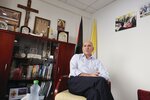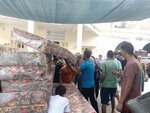.jpg)


JERUSALEM — “Nobody is safe,” Joseph Hazboun says, giving his assessment of the rapidly deteriorating situation in the Gaza Strip, the smaller of the two Palestinian territories in the Holy Land.
Hazboun, the regional director of the Catholic Near East Welfare Association’s Jerusalem Field Office, is grim-faced as he laments the losses being suffered by members of his own team who live and carry out the Association’s work in the tradition of the Good Samaritan in the Gaza Strip.
Sami Tarazi, was an exceptional student and a Boy Scout when he earned a CNEWA (an acronym pronounced Canaywa), scholarship to help fund his university education in Gaza. He began working part-time for the Association then, later becoming a very competent full-time staff member.
“We supported the Scout troop in Gaza with a two-year program. He proved himself to be a good leader in the Scouts,” Hazboun said. “Sami was really the best, without competition. He continues to prove himself up to the task.”
Before the Israeli Defense Forces launched a ground invasion into Gaza in response to the Oct. 7 Hamas terrorist attack on the kibbutzim along Israel’s southern border, which killed 1,200 people, and saw 200 other men, women and children taken hostage back into the territory they controlled, they carried out daily airstrikes in an effort to rout terror operatives.
One of those air strikes struck a residential building in Gaza City where several of Tarazi’s family members lived.
“It was really tragic that he lost both his parents in the building that was struck last week with an Israeli airstrike. His sister lost her six-month-old baby. It was really traumatic. He’s taking care of his sister and another relative who cannot walk,” Hazboun said of his dedicated staff member, who also vowed to continue his mission with CNEWA.
Tarazi and his surviving family members sought refuge in first the Orthodox convent and then the Latin convent as Christian entities, such as the ancient St. Porphyrius Church, which was seriously damaged in another airstrike, became targets.
The Catholic Near East Welfare Association, headquartered in New York City, was founded as a Pontifical Mission by Pope Pius XI in 1926 as an “instrument of love and a sign of hope for those in need scattered throughout the historic but unstable lands of the ancient Eastern churches — the Middle East, Northeast Africa, India and Eastern Europe.”
It uses monetary resources from generous donors around the world to assist in their ministries the laity, priests, sisters and bishops of the local churches – which the Association refers to as its “boots on the ground,” – in the numerous areas it serves in Iraq, Israel, Jordan, Palestine, Lebanon, Syria, Egypt, Eritrea, Ethiopia, India, Armenia, Georgia and Ukraine.
Although the Christian community in Gaza only numbers around 1,000, they have an outsized impact on the community.
CNEWA supports 17 institutions in Gaza, which before the war served 300,000-400,000 people a year.
“So that’s the true size of the Christian community in Gaza. It’s not their numbers, it’s their services,” Hazboun said.
“The motto 30 years ago was ‘Need not Creed,’ and that continues to be our guiding principle.”
As the air war was about to begin, Hazboun received reports from Tarazi and George Antone, with whom Rhode Island Catholic spoke briefly before phone service was blacked out.
They sought a green light from Hazboun to make a large purchase on credit, where possible, before supplies run out.
“I told my people in Gaza that whatever they need, provide it and we’ll see how we can cover it. I don’t want anyone who has taken refuge at any of the Christian institutions to be left out or feel that they are not taken care of. We are there to serve those in need,” he said.
That includes spending 60,000 NIS (about $15,000), to provide enough cheese for one month for those seeking refuge in the convents and the Cultural Center in the early days before it was destroyed.
“The is one of the bills that we are going to receive in the coming days, and we have to pay them,” Hazboun said.
The Gaza office provided 200 food packages to the Muslim neighbors who stayed in their homes surrounding the churches.
Hazboun, who has worked in the Jerusalem Field Office for the past 30 years, and has served as the regional director since 2017.
CNEWA provides financial support to local agencies working in the health, education and social services sectors of the areas they serve.
“We provide support to hospitals, clinics, medical centers, and the like, so they can continue to provide quality services,” Hazboun said of the Association’s work in Gaza, just one of three areas supported by his office, which also serves those living in the West Bank and East Jerusalem.
In the area of education, CNEWA supports schools, kindergartens, nurseries, youth institutions, including the YMCA in Gaza.
While the local Orthodox Church Council built the Arab Orthodox Cultural Center, in 2019, CNEWA supported them with small grants. Since they’ve opened, the Association has been supporting them with employment until the center is able to function to its fullest capacity and generate sufficient funds to be self-sustainable.
Inaugurated in 2019, the Center was a “shining jewel,” Hazboun said, until it, too, was destroyed in an Israeli air strike. Before the strike, 3,000 Muslims and some Christian families sought refuge there as they thought they were safe from aerial attacks.
The Rosary Sisters School, with which CNEWA has worked extensively, is one of five Christian schools in Gaza. It was likewise damaged in an air strike, but not completely destroyed as was the Cultural Center.
“Sister Nabila had a chance to make a quick visit to check on the school. It is heartbreaking,” Hazboun said of the damage.
CNEWA also provides annual support for three mother and child clinics of the Near East Council of Churches in Gaza.
“We also have a three-year psycho-social activities program with a women’s charitable society with a goal to enhance and improve three community-based organizations and turn them into institutions that can provide professional psycho-social support to children,” Hazboun said.
CNEWA has funded the building of soccer fields for people to enjoy a positive and uplifting activity, with the fields then becoming a revenue stream for the community when they are rented occasionally for other uses.
Hazboun said it is very difficult most days now to maintain contact with the staff and religious in the 25-mile-long and six-mile-wide coastal enclave along Israel’s border with Egypt, especially with the population being encouraged by the IDF to move south for their safety.
Only about 45 miles separate his Pontifical Mission office in Jerusalem’s Old City with his colleagues in Gaza City, but the Israel-Gaza War is taking a toll on CNEWA’s efforts to provide assistance in the embattled territory, where a large number of Gazans are refugees from the 1948 and 1967 wars with Israel.
“People will not leave; they have nowhere to go. They know if they leave, they will never be able to come back again,” Hazboun said.
The director is looking ahead to ramping up services again after the war, including their support of local hospitals, as well as an ongoing project with the YMCA and the renovation of Brotherhood Park, a name which strikes an optimistic note for Gaza’s future.
“God knows what will happen,” he said. “We will have much more to do after the war.”